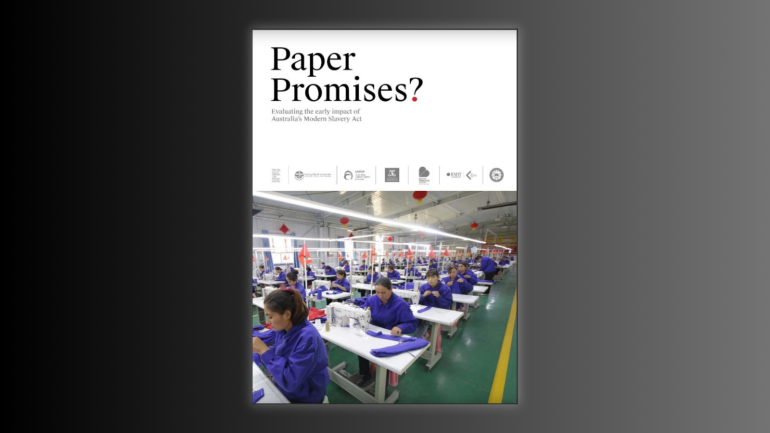A coalition of human rights organisations, church groups and academics are calling on the federal government to strengthen Australia's modern slavery laws after releasing a major new investigative report which found that many companies are failing to identify obvious risks of forced labour in their supply chains or take action to address them.
The report, Paper Promises? Evaluating the early impact of Australia’s Modern Slavery Act, examines statements submitted to the Government's Modern Slavery Register by 102 companies sourcing from four sectors with known risks of modern slavery: garments from China, rubber gloves from Malaysia, seafood from Thailand and fresh produce from Australia. It found that:
- 77% of companies reviewed had failed to comply with the basic reporting requirements mandated by the legislation;
- 52% had failed to identify obvious modern slavery risks in their operations or supply chains. Only one in four garment companies sourcing from China, for instance, made any mention of the risk of Uyghur forced labour in their supply chains;
- Just 27% of companies appeared to be taking some form of effective action to address modern slavery risks;
- The lowest scoring companies included Lite & Easy, Drakes Supermarkets and Clifford Hallam Healthcare, while the highest included Woolworths, Coles and Kathmandu.
The coalition have called for a range of measures to strengthen the regime, including the addition of penalties for companies that fail to comply with the law, mandatory due diligence requirements, improved access to justice for workers and better guidance for companies sourcing from high-risk sectors.
Freya Dinshaw, Senior Lawyer at the Human Rights Law Centre, and report co-author:
“The Modern Slavery Act was meant to drive a ‘race to the top’ by business to address modern slavery in global supply chains, but our research indicates most companies have barely left the starting blocks. Many companies have published modern slavery statements, but when you drill down into the detail, many aren't even at the point of identifying the most obvious risk areas in their supply chains, let alone taking meaningful action to address them.
“It is increasingly apparent that reporting alone is not going to be enough to drive fundamental change. When you speak to a glove worker in Malaysia forced to work around the clock to make PPE for the COVID crisis, or a migrant worker on an Australian farm working in terrible conditions, it brings home just how much more needs to be done. If the Government is serious about eliminating modern slavery, it must strengthen the Modern Slavery Act to make it enforceable and require companies to take action.”
Amy Sinclair, business and human rights specialist, and report co-author:
“We found reporting standards under the Australian Modern Slavery Act to be seriously lacking. Three in four of the companies we assessed don’t comply with the law. Looking below the surface, the story is more worrying still. Most statements reveal little evidence that companies understand the salient risks present in their operations and supply chains, or that they are taking the necessary steps to address them. The small clusters of leading companies who are showing what is possible should be commended for their efforts. Looking forwards, those that are lagging should be forced to act to eliminate modern slavery from the goods we use every day.
“This new report is important because it shows not only where the gaps are in companies’ efforts to address modern slavery, but provides a roadmap for how these gaps should be filled.”
Professor Justine Nolan, Director, Australian Human Rights Institute (UNSW Sydney):
“Early corporate responses to reporting under the Modern Slavery Act indicate that there is a real danger of prioritising a ‘tick-box’ approach to compliance which is unlikely to lead to real improvements in reducing the risk of modern slavery in supply chains. We are now at a critical juncture where there is some awareness of the risks, but the corporate responses are cosmetic rather than substantive. This needs to change.”
Dr Mark Zirnsak, Senior Social Justice Advocate, Uniting Church of Australia (Synod of Victoria and Tasmania):
“Too many corporations are taking actions to detect and respond to the risks of modern slavery in their supply chains that avoid empowering workers to defend and uphold their own rights. For example, only a handful of companies reviewed have any meaningful collaboration with trade unions to address the risks of modern slavery. The Australian Government also needs to be developing more targeted guidance to assist corporations to identify and respond to modern slavery in high risk industries and high-risk locations.”
Background:
This research was undertaken by the Human Rights Law Centre, Uniting Church of Australia Synod of Victoria and Tasmania, Baptist World Aid Australia, independent specialists, and academics from the Australian Human Rights Institute (UNSW Sydney), Business and Human Rights Centre (RMIT), the University of Melbourne and the University of Notre Dame Australia as part of a 2-year collaborative project evaluating company responses to Australia's new modern slavery reporting regime, introduced in 2018.
The Modern Slavery Act requires entities with annual turnover of over $100 million to submit a modern slavery statement that describes the risks of modern slavery within their operations and supply chain, and the measures they are taking to address those risks. The Act is due to be reviewed later this year.
